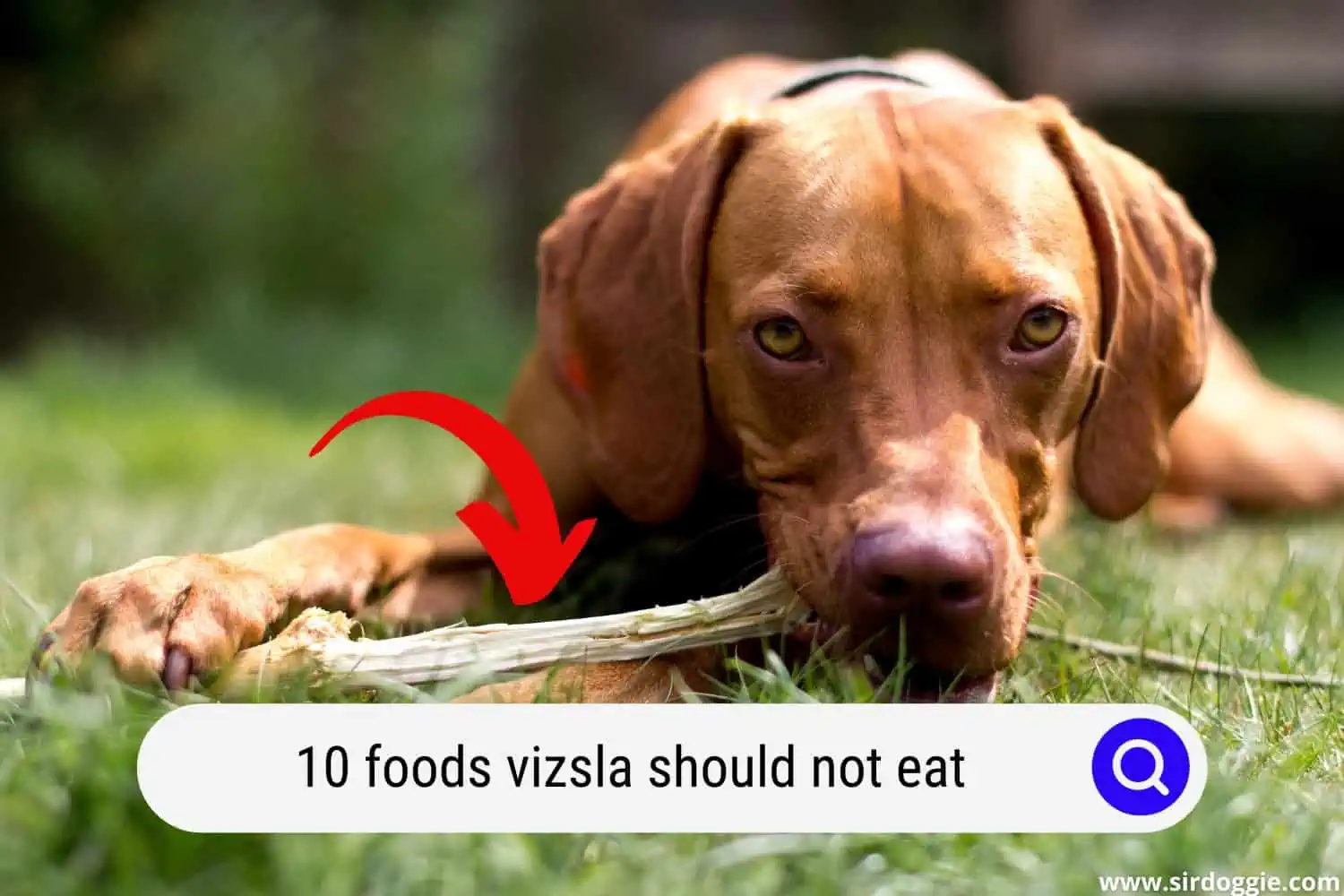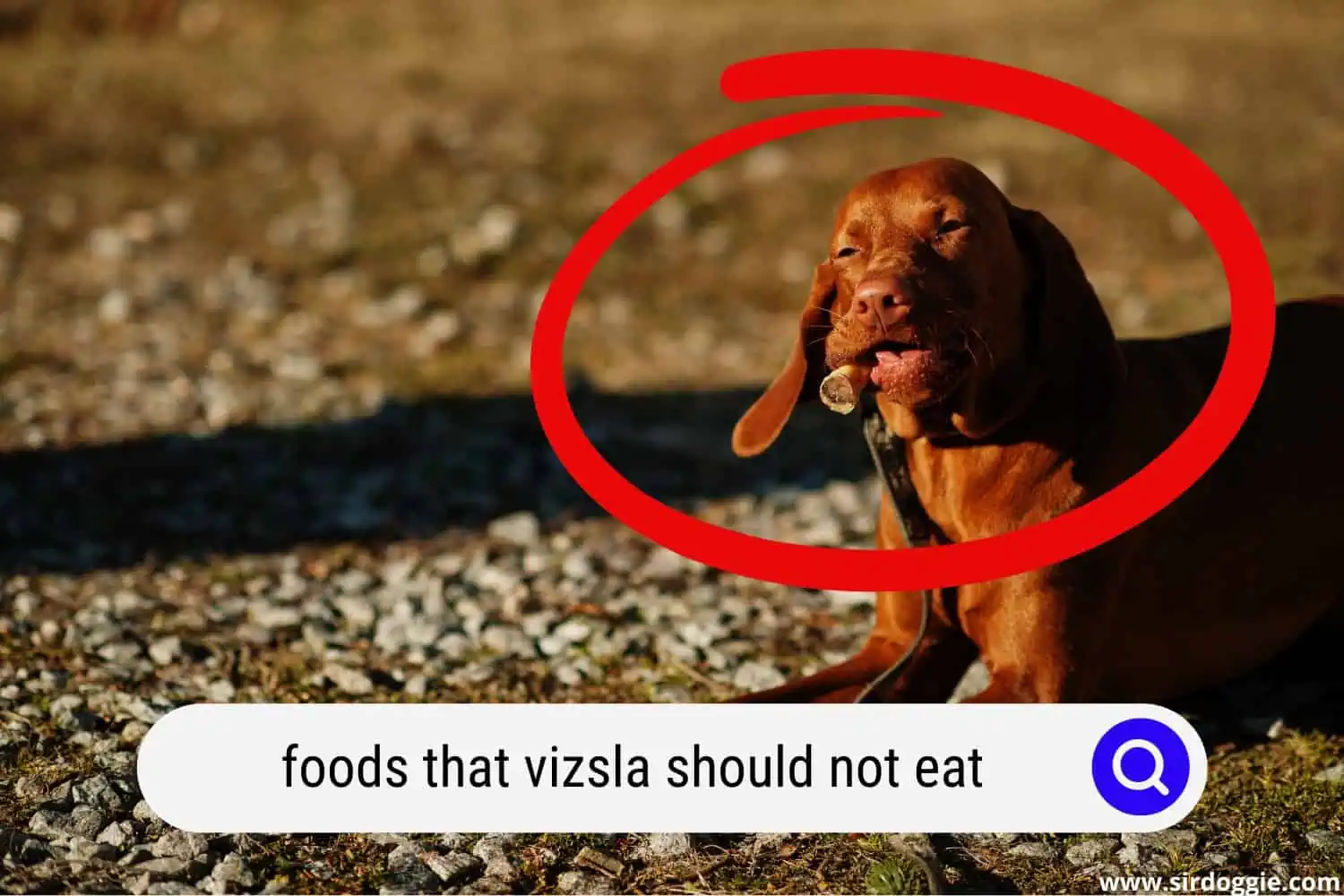10 Foods Vizsla Should NOT Eat
Vizslas are incredible pets that have specific features that identify them. They are affectionate, friendly, intelligent, and very active when it comes to physical activities. The latter is because they are dogs with excellent hunting skills, so they must exercise regularly.

However, not everything is rosy. Having a dog such as the Vizsla carries great responsibility when feeding it. There are several foods that all dogs should not eat to avoid getting sick. We must bear in mind that human food is not good for our Vizsla since its organism, although it is similar to ours, is not the same.
Therefore, below you will see 10 of the foods that your Vizsla should not eat:
Chocolate
As we have said previously, the organism of a dog is different in certain aspects of ours. Chocolate is one of the most dangerous foods for a dog since it could kill it. That’s because this delicious food has an intoxicating substance called Theobromine that is toxic to a dog.
This substance can cause severe damage to the nervous system of our Vizsla as well as cause seizures, vomiting, dehydration, allergies, arrhythmias, or increased blood pressure.
Avocado
Often, people who have dogs feed them healthy treats such as fruits or vegetables. However, not all of them are beneficial to the health of your Vizsla. Avocado is a delicious fruit that is very healthy for people. Unfortunately, dogs should not consume it.
Avocado contains a toxin called Persin. This substance is toxic to dogs and can become potentially dangerous. If we feed our Vizslas with this fruit, they could have digestive problems or shortness of breath.
Dairy Products
Many times, we do not have dog food, and we have no choice but to feed our pets with food that we have in the fridge. It is very likely that some of them are dairy.
Dairy products are a group of foods that can be cheese, milk, ice cream, etc. Some people are even allergic to these foods. In the case of our Vizslas, we must bear in mind that dogs do not have the enzyme lactase, which is in charge of digesting lactose. That can lead to intestinal problems, diarrhea, or vomiting.
Onion
Your Vizsla could develop anemia if you feed it with onion. It is possible that nothing bad happens if you give small portions to your pet. However, large amounts of onion could be hazardous.
This food contains an inorganic compound called Thiosulfate that can destroy a dog’s blood cells. This dangerous situation can cause your Vizsla to suffer from anemia requiring, in many cases, a blood transfusion.
Related Reading: Can a Vizsla Eat a Pizza?
Garlic
Garlic is similar to the onion situation. This food can be found in many places in different ways. One of them is spices. Many foods have spices that may contain garlic.
Garlic has a stronger toxic effect than onion. This vegetable also contains Thiosulfate and can cause anemia or kidney failure in our dogs. That is due to the loss of red blood cells.
Grapes
Acute kidney failure in dogs is a consequence of excessive consumption of grapes or raisins. These fruits can be very toxic to our Vizslas, and it is not yet known why. It contains unidentified chemical compounds that are responsible for negatively affecting these pets.
This condition presents symptoms in dogs that include vomiting, diarrhea, dehydration, or lack of appetite which can be very dangerous for our Vizslas. That could even cause death.
Caffeine
Coffee is essential for most people on the planet since it is the one that gives them the energy to work during the day. Dogs, on the other hand, are sensitive to this stimulant.
Coffee or soda are prohibited beverages for a dog since they could cause serious effects on its body. The nervous system of your Vizsla can be negatively affected, causing vomiting, diarrhea, spasms, hyperactivity, fast heart rate, or even death. Never give your Vizsla a drink that contains caffeine.
Xylitol
It is an artificial sweetener used in chewing gum, candy, or baked goods. It should be noted that these products do not have sugar. The ones that contain this component are prohibited for dogs due to their high level of toxicity.
If you feed your Vizsla with a product that contains xylitol, you could endanger its life. This sweetener severely lowers blood sugar levels causing liver failure. Symptoms include vomiting, loss of coordination, lethargy, disorientation, or seizures, which can occur in just a few minutes or hours.
Don’t take this situation lightly. If you notice that your dog consumed any product with this sweetener, then you should immediately take it to the vet.
Nuts
Some nuts are toxic to dogs. They have a high content of phosphorus that can produce stones in the bladder of your Vizsla. Macadamia nuts are poisonous to these animals, presenting symptoms including vomiting, muscle pain, hypothermia, joint swelling, dizziness, fever, and more.
Similarly, some other nuts such as hazelnuts, almonds, or peanuts can cause pancreatitis due to the high amount of oils and fats they contain. It should be noted that they are not prohibited foods. You can give your Vizsla nuts only as a supplement, that is, in small quantities.
Bones

To say that bone is a food that we should not give our Vizsla may sound silly. We all know that dogs love bones. However, they can become dangerous for these animals, depending on different situations.
Not all bones are good for dogs. There are huge bones that are dangerous for smaller dogs. It is not the case with the Vizslas. Now, the bones of chickens and fish have a small size that can get stuck in your dog’s throat.
Regardless of size, there are chipped bones that can tear the throat and some vital organs of our Vizsla. That is why we must be extremely careful when we give our pets a bone.

Family Dog Expert Author
Hi there! I’m Stuart, a devoted dog lover and family dog expert with over a decade of experience working with our furry companions. My passion for dogs drives me to share my knowledge and expertise, helping families build strong, loving bonds with their four-legged friends. When I’m not writing for SirDoggie, you’ll find me hiking, playing with my beautiful dog, or studying music.